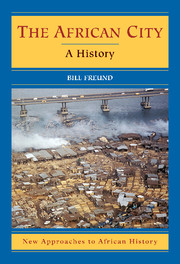Book contents
- Frontmatter
- Contents
- PREFACE
- 1 Urban Life Emerges in Africa
- 2 African Cities and the Emergence of a World Trading Economy
- 3 Colonialism and Urbanisation
- 4 Cities in Revolt: The Long-Term Crisis of South African Urbanism
- 5 The Post-Colonial African City
- 6 Globalisation and the African City: Touba, Abidjan, Durban
- INDEX
1 - Urban Life Emerges in Africa
Published online by Cambridge University Press: 05 June 2012
- Frontmatter
- Contents
- PREFACE
- 1 Urban Life Emerges in Africa
- 2 African Cities and the Emergence of a World Trading Economy
- 3 Colonialism and Urbanisation
- 4 Cities in Revolt: The Long-Term Crisis of South African Urbanism
- 5 The Post-Colonial African City
- 6 Globalisation and the African City: Touba, Abidjan, Durban
- INDEX
Summary
In the preface and, by implication, in the title of this chapter, I have suggested that cities evolve; I accept an essentially evolutionary model in my analysis of what follows. It is possible to argue rather that there are or were uniquely African kinds of cities or towns, before the incorporation of Africa into world-systems with wide economic networks and defining urban cultural structures, as a cultural statement about Africanness. However, the assumption here is that there are several reasons why urban life emerges anywhere: environmental, ritual, political, and economic, all of which will be examined in more detail. This would be true for any major area in the world and up to a point may come together in very different and quite unique combinations. This volume will emphasise that the evolutionary model needs to be modified to an important extent by the incorporation of earlier elements into later urban development, just as forms of rural settlement may be carried into urban ways of living. Old cities are inevitably accretions with layers that survive from their past, cultural if not physical. The division of this African urban history into chapters that look at the impact of incorporation into the beginnings of a world-economy, at colonialism and at the post-colonial situation, tries to give character to evolutionary change, but it does not mean to suggest that there are no continuities from one phase to another.
Africa is an ideal setting for studying the beginnings of urbanisation.
- Type
- Chapter
- Information
- The African CityA History, pp. 1 - 36Publisher: Cambridge University PressPrint publication year: 2007

